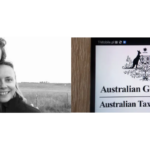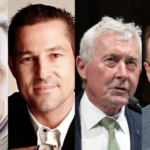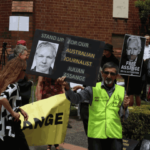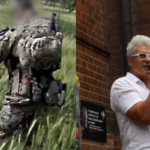Mounting Political Prosecutions Indicate Authoritarian Creep Continues Under Albanese
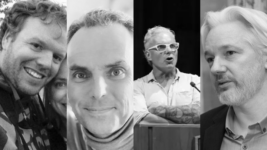
The Independent National Security Legislation Monitor last week held public hearings regarding the National Security Information (Criminal and Civil Proceedings) Act 2004 (Cth), as it’s inquiring into the impact it’s had on recent cases, especially the prosecutions of Witness K and Bernard Collaery.
Former attorney general Christian Porter decided to proceed with charges, established five years earlier, against K and Collaery in mid-2018, after they’d publicly exposed the Howard government as having illegally bugged the Timor-Leste cabinet to gain advantage in fossil fuel negotiations in 2004.
The laws affected K’s and his lawyer Collaery’s cases, as Porter issued a certificate under section 26 of the NSI Act, which ensured that much of the details involved in the prosecution of the ex-ASIS officer, who’d been in charge of the Timor-Leste bugging, and his barrister were shrouded in secrecy.
Appearing at the INSLM hearings last week, Collaery’s legal team gave a damning appraisal of the way in which the NSI Act had hindered its client’s case to the point that when it was dropped in July last year, deliberations on what could be heard in open court were still not finalised four years on.
And while the Albanese government did take the stage promising whistleblower law reform and it did bring the case against Collaery to an end, over a year into the Labor administration’s term, most of the major prosecutions remain, while a new form of politically-motivated case has emerged.
A cold war casualty
The case of 54-year-old Australian citizen and former US marine fighter pilot, Daniel Duggan, who’s being held in extreme isolation at Lithgow Correctional Centre at the behest of the US doesn’t involve a whistleblower, but rather a political pawn in the White House war on China campaign.
After returning to Australia last October from China, where he’d been managing a flying school, Duggan was arrested in the NSW town of Orange, on a US indictment claiming his training of Chinese pilots at a South African commercial flying academy early last decade breached US arms control law.
Australian Greens Senator David Shoebridge has pointed out that the timing of the US request to extradite the local citizen, which attorney general Mark Dreyfus then approved in December, having taken place as military tensions between Washington and Beijing mount is no coincidence.
But this week’s attempt by Duggan’s lawyers to have a stay placed on his case, while the Inspector General of Intelligence and Security inquires into whether ASIO illegally lured the pilot back to this country in order to arrest him on behalf of the US, failed and the case was adjourned until October.
Erasing the messenger
Dreyfus recently passed amendments to the Public Interest Disclosure Act 2013 (Cth), as he’d been indicating over his final years in opposition that the laws he’d drafted a decade ago, when he last held the position of attorney general, weren’t working to protect public service whistleblowers.
The recent changes, however, were to facilitate protecting those blowing the whistle in relation to the new National Anti-Corruption Commission, which commenced this month, and they do nothing to protect public service whistleblowers already in the grips of the criminal justice system.
Former Australian Taxation Office employee Richard Boyle is a case in point. He went before the court last October to argue the measures he took to expose an unlawful practice employed by the ATO were warranted under the pre-amended PID Act, as it was in the public interest to reveal.
The Dreyfus drafted 2013 laws didn’t provide him with protection against the 24 criminal charges he continues to face, and neither would the amended laws the AG has so far enacted in an effort to clean up the PID Act have saved Boyle either, even though they’re supposed to protect disclosers.
The AG has done nothing to address Boyle’s case, despite multiple inquiries supporting his claim that the tax office was acting illegally, and the practice in question has since been brought to a halt. And Dreyfus didn’t attempt to move his amendments until after Boyle’s defence had been argued.
Boyle, who lives in South Australia, is now set to appeal his public interest disclosure defence case outcome in August.
Truth is a lonely warrior
The other major political prosecution that could have been affected by PID Act amendments was that of former ADF lawyer David McBride, who exposed that Australian special forces were perpetrating war crimes in Afghanistan to the ABC mid-last decade.
McBride is set to stand trial in November on five national security charges, despite major community and political support for the case against him to be dropped, especially as the government-commissioned Brereton inquiry supported his efforts in exposing the crimes of the Afghan war.
The ex-military lawyer wasn’t even able to argue his defence under the PID Act, as stipulations were placed upon his case, which meant that the only two witnesses appearing on his behalf were blocked from testifying and the prosecution was given the ability to remove any of his evidence.
Indeed, McBride was at Parliament House on Tuesday, accompanied by Senator Shoebridge, as they both called for the Australian War Memorial to display a copy of the ex-ADF lawyer’s indictment at the place of remembrance, as, in speaking out, he maintains he was only fulfilling his defence duties.
The crackdown on truth
The most high-profile political prosecution at present is taking place outside of our jurisdiction, which is the long-drawn-out White House attempt to extradite Australian citizen and publisher Julian Assange from the UK, over his having published thousands of leaked classified US files back in 2010.
The WikiLeaks founder’s persecution at the hands of our nation’s two closest allies has similarities with all the cases taking place on local soil right now, especially Duggan’s, as it’s Washington aiming to take custody of and prosecute an Australian citizen on questionable grounds in both examples.
Unlike McBride, Boyle and Duggan though, the Albanese government has publicly questioned the proceedings against Assange, who merely published documents provided to him in an expected journalistic manner, but it has only done so in the sense that the case has been dragging on too long.
PM Anthony Albanese has repeatedly stated that “enough is enough”, until it’s become an Assange policy position. However, foreign minister Penny Wong dashed all hopes of her government intervening a fortnight ago, as she admitted that our power to do so has already been exhausted.
Assange’s case represents a threat to basic press freedoms globally, as the US is setting a precedent whereby governments can reach across borders to punish foreigners who publish details about them that they find inconvenient. And the UK has been contemplating passing laws to do the same.
Similarly, the cases of McBride and Boyle reveal that those who speak out against government corruption over here will be severely punished. And while Collaery’s prosecution was dropped, he was at a point where he was set to expose key case details that the government wanted kept secret.
But as for Duggan, things appear differently. The ex-marine was teaching foreigners how to fly planes: a practice that UK and Australian pilots were regularly involved in as well.
Yet, now it seems that he’s set to play the part of the fall guy, in a scenario in which China is being framed as the aggressor.


